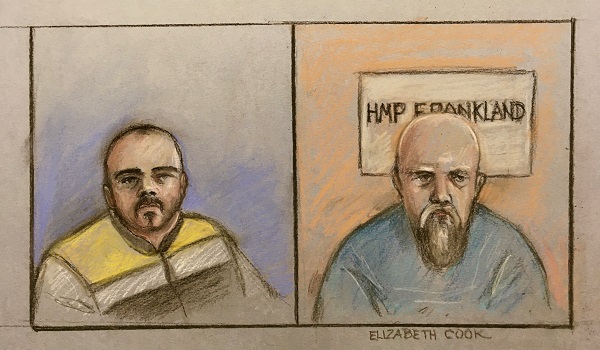Whole-life term for Couzens 'excessive' Court of Appeal told
Wayne Couzens deserves “decades in jail”, his barrister has told the Court of Appeal, but argued that the imposition of a whole-life term was excessive.
The former police constable was handed the sentence last year for the rape and murder of 33-year-old Sarah Everard after he abducted her in South London on March 3, 2021.
It was the first time the sentence had been imposed for a single murder of an adult not committed in the course of a terror attack.
On Wednesday (May 4), senior judges heard challenges or appeals to the prison sentences of five killers, including the whole-life terms of Couzens and double murderer Ian Stewart.
A bearded Couzens, wearing a grey jumper, appeared by video-link from HMP Frankland at the start of the hearing for his appeal against his whole-life term. Members of Ms Everard’s family were present in the Royal Courts of Justice as the his appeal was discussed.
Jim Sturman QC, for Couzens, said: “Mr Couzens accepts that his crimes are abhorrent and nothing I say in any way is intended to minimise them or to minimise the impact of these crimes on Sarah Everard’s family and huge circle of friends.”
He told the court that it was accepted that Couzens deserved “decades in jail”. Mr Sturman added: “The combination of his remorse and his guilty pleas… should balance out that aggravating factor which clearly exists, of him being a police officer, albeit off-duty in half uniform.”
The barrister told the court that Couzens was unique out of the 64 people currently serving whole life orders.
He said in written submissions: “Whilst this may well be considered by the public and the court to be a case of equal seriousness to a political, religious, or ideological murder, it is not such an offence, not does it fall into any other category listed in the schedule.”
Mr Sturman later argued that police officers are not unique in being able to detain people, giving an example of a teacher able to detain vulnerable pupils.
He concluded: “A lot of very unique and very horrible cases come before the court…. but in our respectful submission, the court should think long and hard and step back from a whole-life order in this case.”
Tom Little QC, representing the Attorney General’s Office (AGO) and Crown Prosecution Service, said Couzens’ offending was of the “utmost seriousness”, adding: “His criminality was, as found by the judge, a fundamental attack in reality on our democratic way of life. A police officer is in a uniquely powerful position.”
Mr Little said the sentencing judge had provided a “clear and coherent justification” for the sentence that he imposed.
“The judge was entitled to form the view that he did in relation to a lack of genuine contrition,” he added.
Mr Little concluded: “The whole-life order was the right sentence to impose in this wholly exceptional case.”
Emma Tustin and Thomas Hughes, who killed six-year-old Arthur Labinjo-Hughes in June 2020, also had their sentences reviewed during the same hearing.
Arthur suffered an unsurvivable brain injury while in the sole care of Tustin, who was jailed for life with a minimum term of 29 years.
Tustin and Arthur’s father, Hughes, who was sentenced to 21 years for manslaughter, appealed against the length of their sentences which are also being challenged as being unduly lenient.
Mr Little said Tustin’s case “merited at the very least consideration of a whole-life order”.
He said: “This was, we accept, not a straightforward sentencing exercise. The trial was plainly a harrowing one for all concerned.”
Mr Little said Arthur was “subjected to the most unimaginable suffering”, adding: “This was an extremely serious example of child murder against the background of that cruelty.”
Mary Prior QC, for Tustin, said the sentencing judge took a “fair and proper approach in this very difficult case”.
Bernard Richmond QC, for Hughes, argued that a judge fell into error and was almost “treble counting” when calculating his sentence.
Double killer Stewart, who was convicted of murdering his first wife six years before he went on to murder his fiancee, also appealed against his whole-life order.
Stewart, who did not attend Wednesday’s hearing, killed 51-year-old children’s author Helen Bailey in 2016, and was found guilty of her murder in 2017.
After this conviction, police investigated the 2010 death of Stewart’s first wife, Diane Stewart, 47, and in February he was found guilty of her murder.
Amjad Malik QC, for Stewart, argued that the whole-life order he was given for the murder of his first wife was not justified in the circumstances of the case.
“When one looks at the whole set of aggravating features with regard to both of these killings it does not fall in any way shape or form as an exceptionally high-seriousness case,” Mr Malik said.
However, Mr Little said: “It is difficult to say that this sentence was either manifestly excessive or wrong in principle.”
Wednesday’s hearing also heard arguments over the sentence of Jordan Monaghan, who was handed a minimum term of 40 years at Preston Crown Court after he murdered two of his children and his new partner.
Mr Little said Monaghan’s murders or attempted murders were of “exceptionally high” seriousness, with “no mitigation here at all”.
But Benjamin Myers QC, for Monaghan, stressed the high bar needed for a whole-life term, which means the criminal would die in prison.
The hearing before the Lord Chief Justice Lord Burnett and four other judges concluded on the same day, with a decision due at a later date.
He said: “We propose to take time to consider our decisions in these very difficult and tragic cases.”







